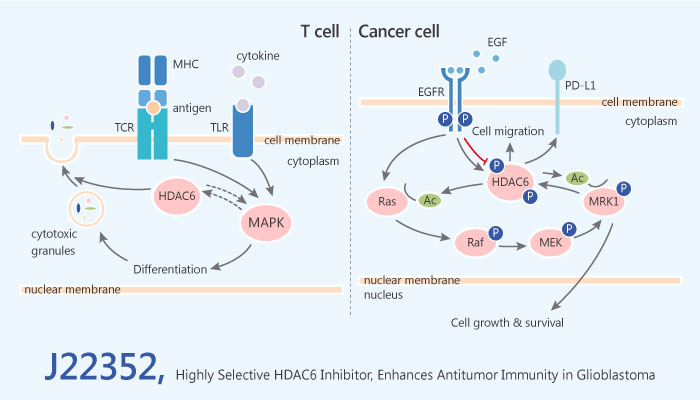Glioblastomas (also called GBM) are malignant Grade IV tumors, where a large portion of tumor cells are reproducing and dividing at any given time. They are nourished by an ample and abnormal tumor vessel blood supply. The tumor predominantly consisted of abnormal astrocytic cells, but also contain a mix of different cell types (including blood vessels) and areas of dead cells (necrosis). Glioblastomas are infiltrative and invade into nearby regions of the brain. They can also sometimes spread to the opposite side of the brain through connection fibers (corpus callosum). It is exceedingly rare for glioblastomas to spread outside of the brain.
Besides, histone acetylation and deacetylation are important epigenetic mechanisms that regulate gene expression and transcription. HDAC6 is a unique member of the HDAC family that not only participates in histone acetylation and deacetylation but also targets several nonhistone substrates, such as α-tubulin, cortactin, and heat shock protein 90 (HSP90). Additionally, HDAC6 impacts numerous process, including cell migration, proliferation and survival. It is overexpressed in glioblastoma, and siRNA-mediated knockdown of HDAC6 inhibits glioma cell proliferation. HDAC6 inhibitors display beneficial effects in various experimental models of cancer.
Liu et al report a highly selective HDAC6 Inhibitor J22352. This inhibitor has PROTAC-like property resulted in both p62 accumulation and proteasomal degradation.

It leads to proteolysis of aberrantly overexpressed HDAC6 in glioblastoma. The consequences decreased cell migration, increased autophagic cancer cell death and significant tumor growth inhibition. Notably, J22352 reduced the immunosuppressive activity of PD-L1, leading to the restoration of host anti-tumor activity. These results demonstrate that J22352 promotes HDAC6 degradation and induces anticancer effects by inhibiting autophagy and eliciting the antitumor immune response in glioblastoma. Therefore, this highly selective HDAC6 inhibitor can act as a potential therapeutic for the treatment of glioblastoma and other cancers.
Reference:
Biochem Pharmacol. High-selective HDAC6 inhibitor promotes HDAC6 degradation following autophagy modulation and enhanced antitumor immunity in glioblastoma. 2019 May;163:458-471.